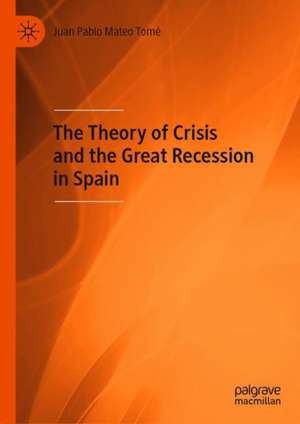The Theory of Crisis and the Great Recession in Spain
Autor Juan Pablo Mateo Toméen Limba Engleză Hardback – 19 noi 2019
This theoretical and empirical heterodox approach will be of interest to students and scholars in political economy, and those with an interest in the Eurozone.
| Toate formatele și edițiile | Preț | Express |
|---|---|---|
| Paperback (1) | 697.00 lei 6-8 săpt. | |
| Springer International Publishing – 19 noi 2020 | 697.00 lei 6-8 săpt. | |
| Hardback (1) | 702.41 lei 6-8 săpt. | |
| Springer International Publishing – 19 noi 2019 | 702.41 lei 6-8 săpt. |
Preț: 702.41 lei
Preț vechi: 826.36 lei
-15% Nou
Puncte Express: 1054
Preț estimativ în valută:
134.41€ • 140.98$ • 111.89£
134.41€ • 140.98$ • 111.89£
Carte tipărită la comandă
Livrare economică 01-15 aprilie
Preluare comenzi: 021 569.72.76
Specificații
ISBN-13: 9783030270834
ISBN-10: 3030270831
Pagini: 213
Ilustrații: XVII, 332 p. 25 illus.
Dimensiuni: 148 x 210 mm
Greutate: 0.57 kg
Ediția:1st ed. 2019
Editura: Springer International Publishing
Colecția Palgrave Macmillan
Locul publicării:Cham, Switzerland
ISBN-10: 3030270831
Pagini: 213
Ilustrații: XVII, 332 p. 25 illus.
Dimensiuni: 148 x 210 mm
Greutate: 0.57 kg
Ediția:1st ed. 2019
Editura: Springer International Publishing
Colecția Palgrave Macmillan
Locul publicării:Cham, Switzerland
Cuprins
1.Introduction: The Political Economy of the Spanish Crisis.- Part I: Foundations of the Theory of Crisis in the Economic Thought.- 2.The Materialist Conception of the Crisis.- 3.Advancing in the Theory of Crisis: Social, Temporal and Geographical Dynamics.- 4.Conventional Economics and the Theories of the Possibility of Crisis.- Part II: A Crisis of Capital Valorization: Profitability, Asset-Inflation and the Composition of Capital.- 5.The Fall in Profitability Underlying the Great Recession.- 6.Construction and the Housing Boom. Analyzing the Price-Effect From The Law of Value.- 7.Why Does Profitability Fall? Paradoxes of Capital Composition and Labour Productivity.- Part III: Controversies Around the Crisis: Why it Happened, What Should Be Done.- 8.This Time It Was Also The Same: Accumulation of Imbalances and Human Failures.- 9.Labor Market, Wages and Crisis.- 10. Financialization and Crisis: From Low Interest Rates to a Credit Boom and Over-Indebtedness.- 11.The Way Out Of Crises. From Diagnosis to a Programme of Economic Policy.- 12.Conclusions.
Notă biografică
Juan Pablo Mateo Tomé is currently Professor in the Department of Applied Economics, Structure and History, Complutense University of Madrid, Spain. His research specialises in Political Economy, International Economics and Development Economics.
Textul de pe ultima copertă
This book has a dual purpose. Firstly, it analyses the concept of economic crises within economic theory, showing the various theoretical foundations and controversies amongst different schools of economic thought. Secondly, it presents an empirical analysis of the Great Recession in Spain, addressing both the growth period from 1995 to 2007-08 and the subsequent depression until 2013-14.
Using a political economy approach, the aim of this book is not to explain the root causes of the 2007-08 crisis but to demonstrate the way in which the tendency towards a crisis manifests itself in a given economy in a historical context. In other words, this book focuses upon the reasons why an issue (such as the crisis of profitability) adopts a certain form, or how it is shaped ─ for example, the process of capital accumulation being led by a real estate bubble. Consequently, the two divisions in this book are linked by the role of the Spanish economy in European capitalism.
This theoretical and empirical heterodox approach will be of interest to students and scholars in political economy, and those with an interest in the Eurozone.
This theoretical and empirical heterodox approach will be of interest to students and scholars in political economy, and those with an interest in the Eurozone.
Caracteristici
Analyses the concept of economic crises within economic theory, showing the various theoretical foundations and controversies amongst different schools of economic thought Explores an empirical analysis of the Great Recession in Spain Uses a political economy approach to demonstrate the way in which the tendency toward a crisis manifests itself in a given economy in a historical context
